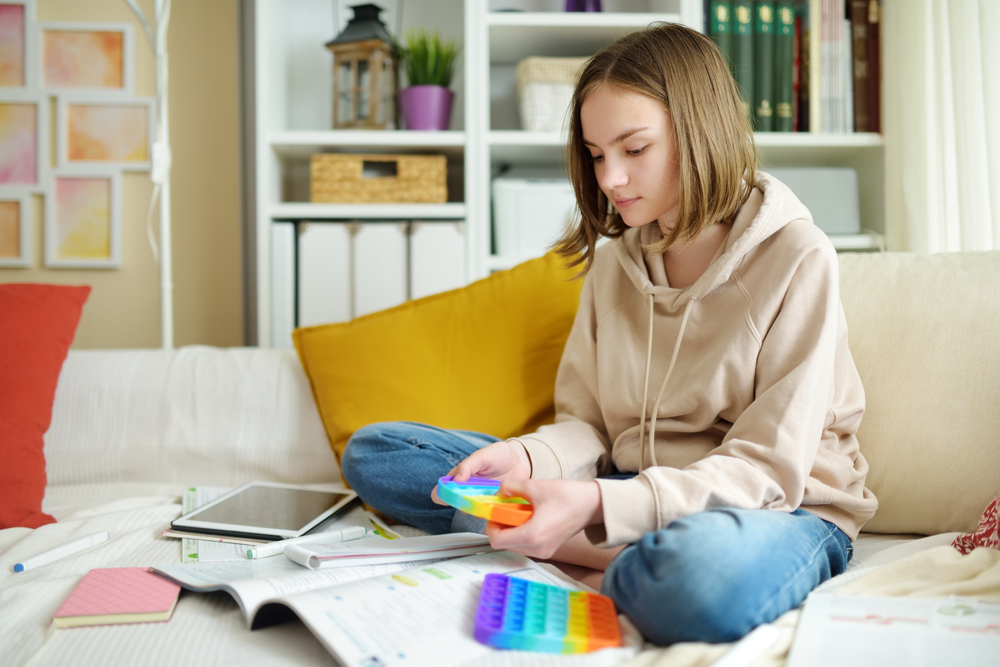Growth and change is a normal part of getting older, but what do you do if you’re concerned about some of your teen’s behavior? You may notice a decrease in eye contact, or maybe they aren’t talking to you as much. Autism is commonly diagnosed in childhood, but adolescents can still exhibit symptoms that may have gone unnoticed earlier in life. An autism diagnosis can provide you and your teen the answers you have been looking for and help them get the support they need to be successful, so let’s look at some of the most common symptoms of autism in adolescents.
Autism in Teens
Children diagnosed with autism spectrum disorder at a young age likely had more obvious symptoms that lead to this diagnosis. For example, these children might have had verbal delays, lacked eye contact, or exhibited an increased sensitivity to stimuli. Less prominent symptoms, though, might go unnoticed until later years, leading to an autism diagnosis later in life. It can be difficult to identify signs of autism spectrum disorder in later childhood and adolescence for a couple of reasons. The first is that, as children get older, they begin to learn about the norms of society and may begin “masking” their symptoms. Masking occurs when someone with autism suppresses their natural response to a scenario in order to mimic neurotypical behavior. This can be both harmful to the person and make it more difficult to obtain a diagnosis.
The other challenge in identifying signs of autism later in adolescence is that behavior could be dismissed as coming from other sources. Parents may dismiss antisocial tendencies, for example, as an act of rebellion or as normal teenage behavior. Sensitivity to change could be written off as a result of hormones or growing independence. Because there will always be multiple possible explanations for a behavior, it’s important to make note of patterns over time to help determine the root cause.
Symptoms of Autism Spectrum Disorder
As a parent or caregiver of an adolescent, you are likely one of the first people to notice changes or concerning behavior. While some of the characteristics of teens with autism differ from younger children, there are a number of symptoms that overlap. Some of the typical identifiers of a teen with autism spectrum disorder include:
- Repetitive behaviors: repeating words or phrases, fixation on facts or details, becoming intensely focused on specific activities
- Irritability
- Sensitivity to light, sound, certain textures
- Difficulty coping with change – especially small changes to routine
- Lack of eye contact
- Inability to read social cues: inappropriate responses, frequent interruption, displaying inappropriate behavior given the context
- Showing little emotion or interest in activities
These symptoms, along with a number of others, may indicate your teen has undiagnosed autism but should not be used as a replacement for a professional evaluation.
Help for Teens with Autism
If you have recently received or are in the process of seeking out an autism diagnosis, the amount of information can be overwhelming at times. With so many different treatment options available, it’s difficult to know where to start in getting your teen the help they need. We know how stressful this process can be, so The Forum offers comprehensive treatment for teens with autism. From psychological evaluations to autism-specific therapy and case management, we help you navigate each stage of the treatment process.
We also offer a 16-week, evidence-based program for teens with autism spectrum disorder. Through participating in our PEERS® Social Skills Group for Adolescents, clients will develop important social skills, create friendships, learn appropriate communication strategies, and develop necessary coping skills. Teens who complete this program see improvements in socio-emotional skills, resulting in stronger relationships and higher performance in school settings.
At The Forum, we understand that parents need support throughout the treatment process. Because of this, we have developed a complementary track for parents of teens in the PEERS® program. We also offer family therapy programs to provide space for parents and teens to develop communication skills together. If you’re looking for more support for your teen with autism or have questions about any of our program offerings, contact us today.



